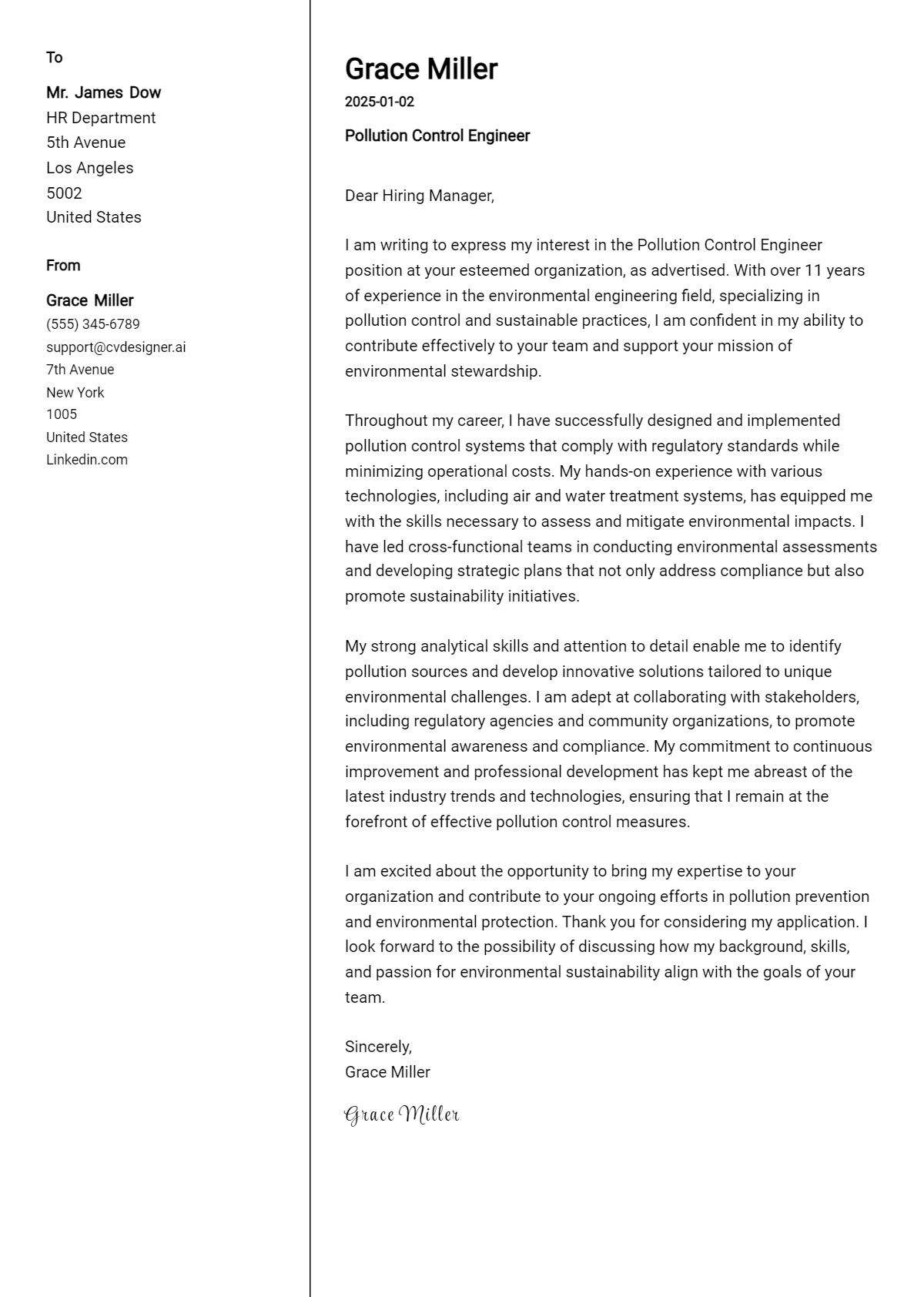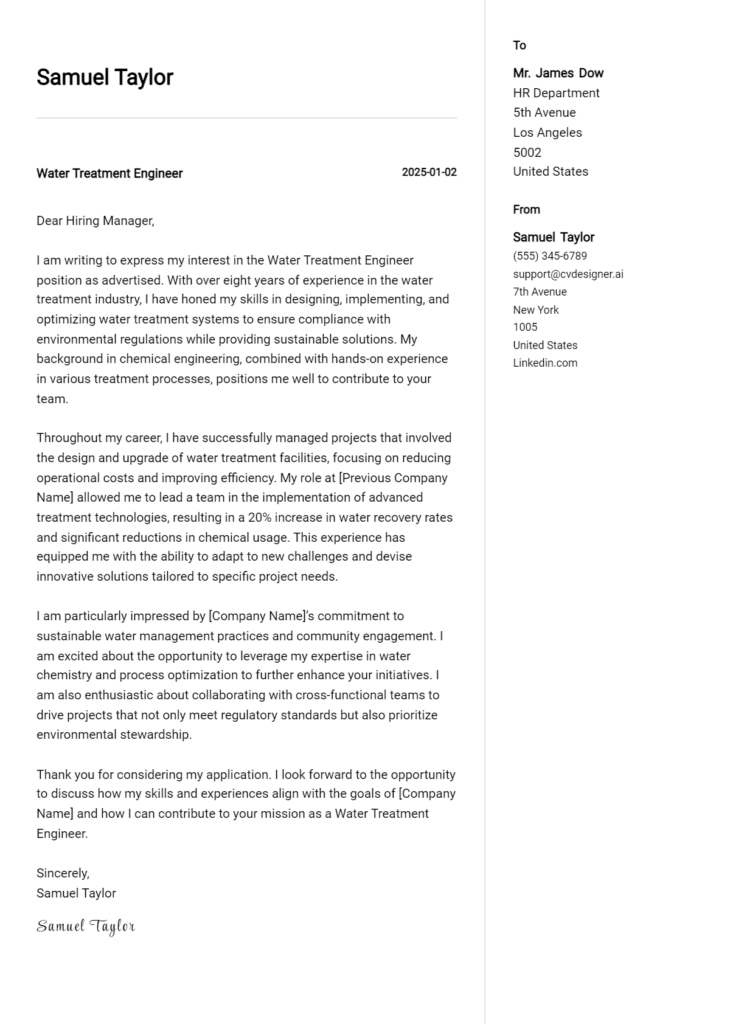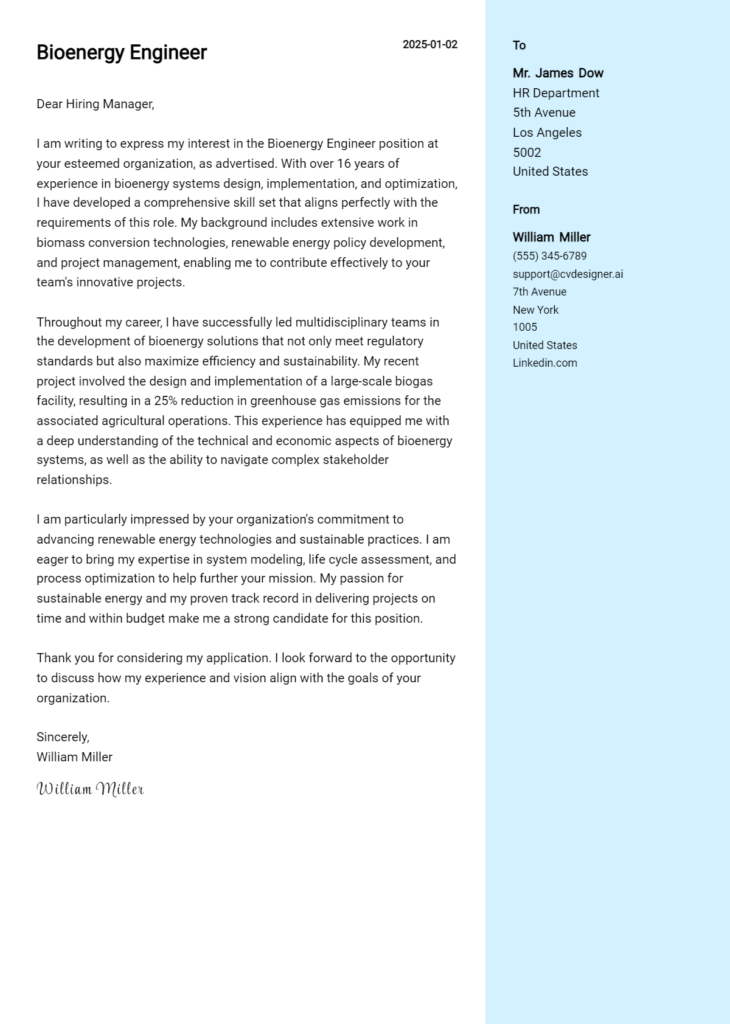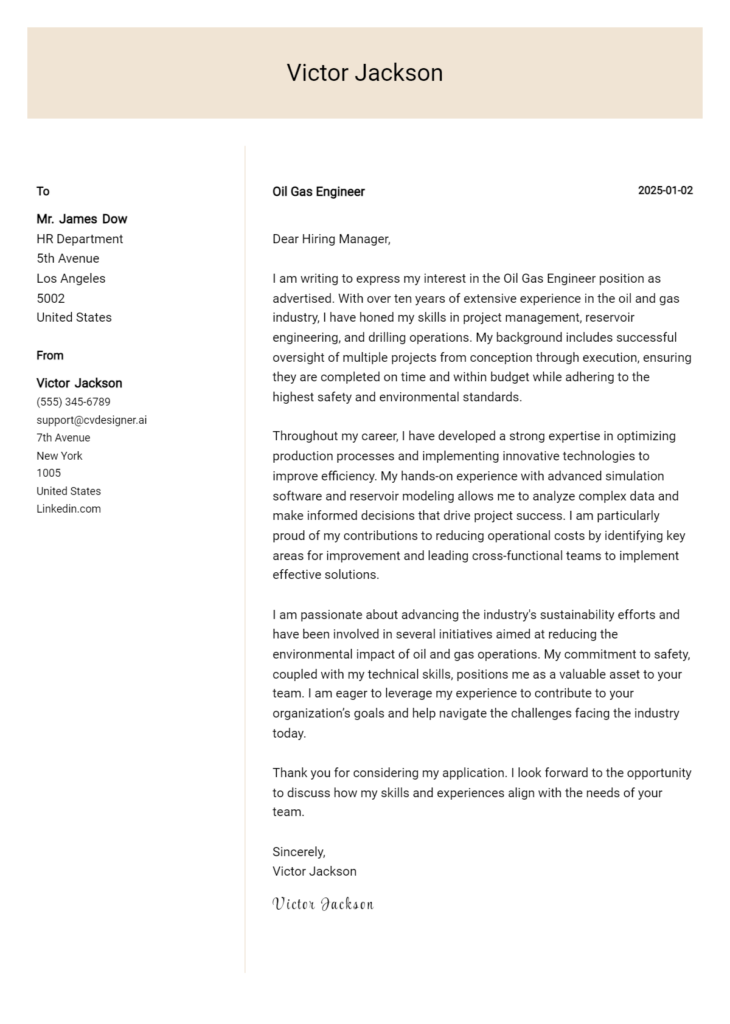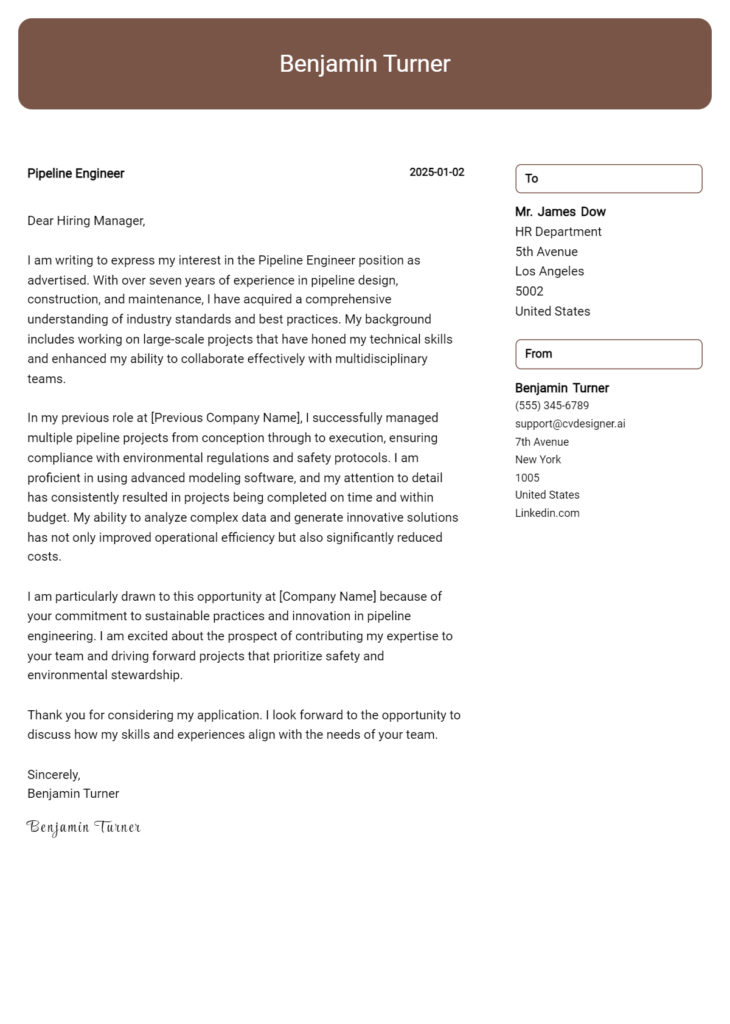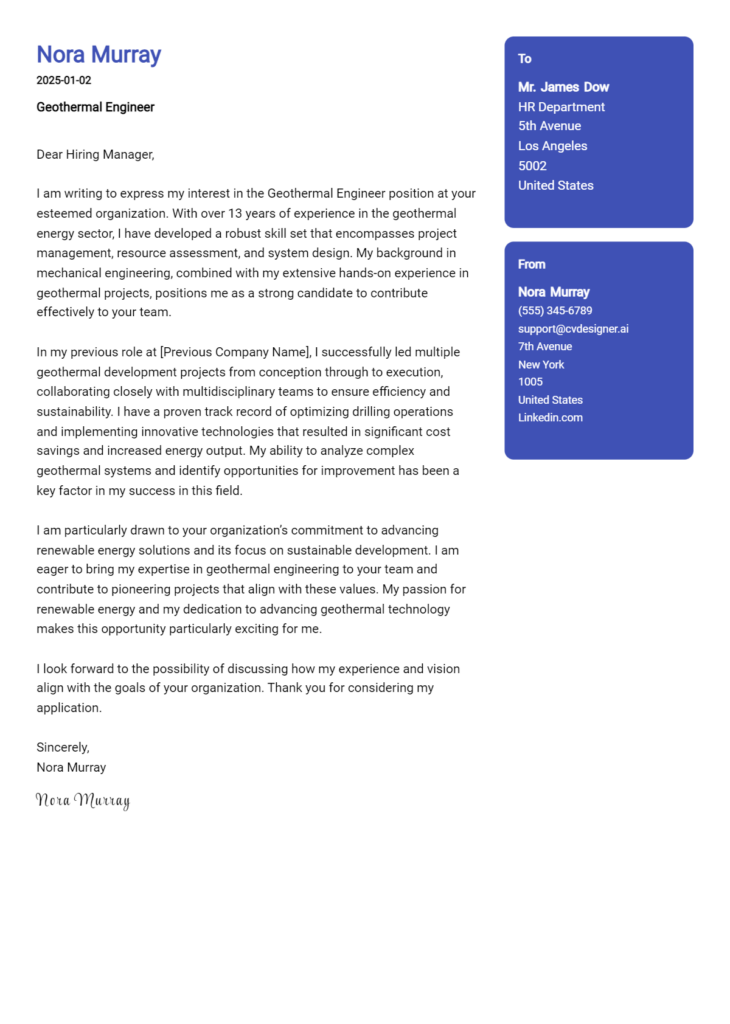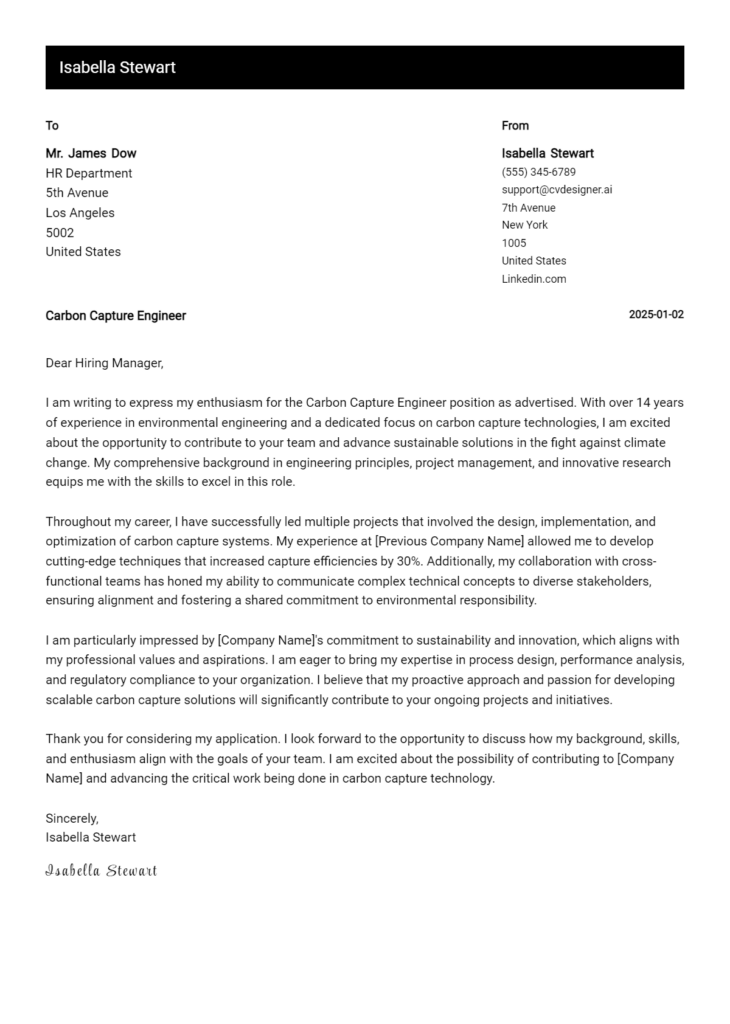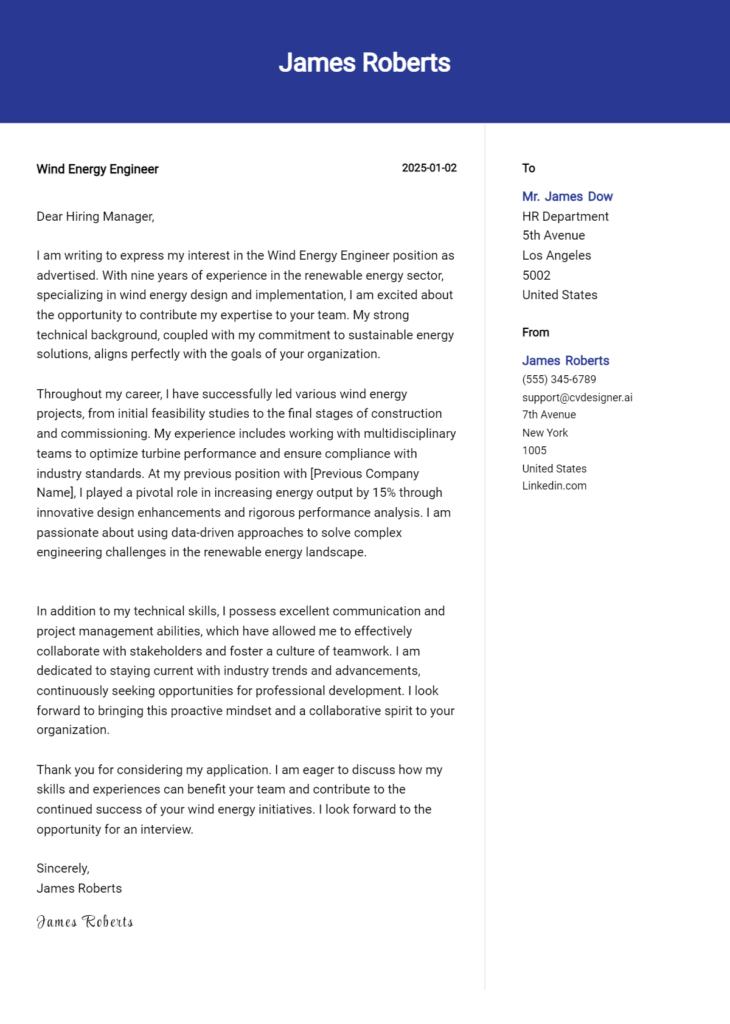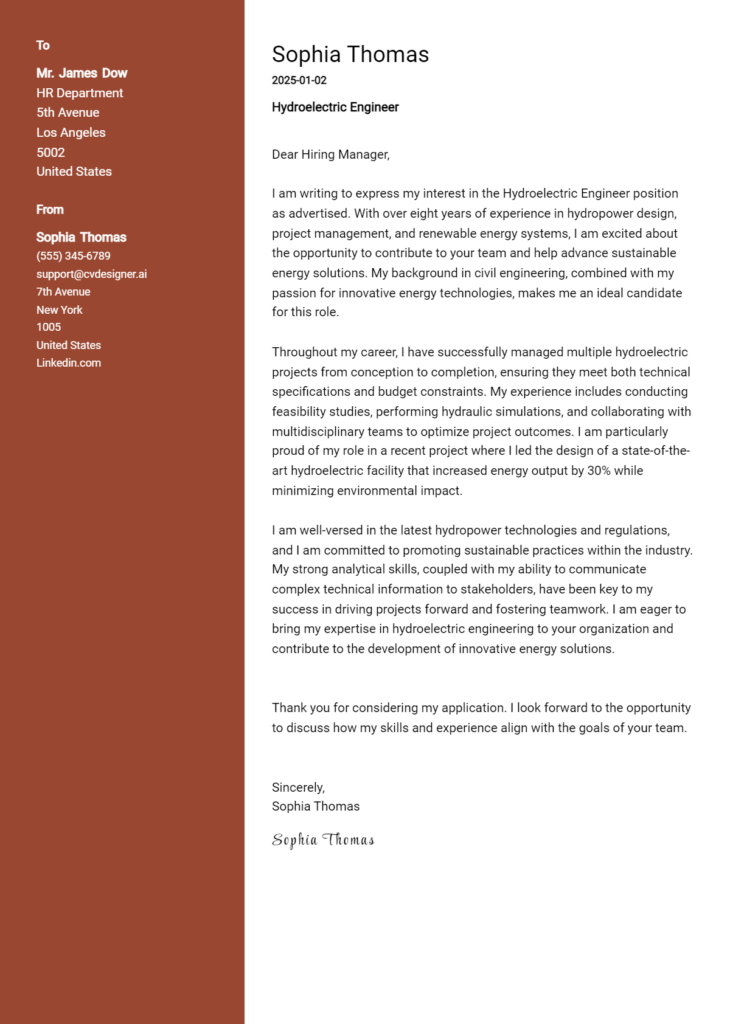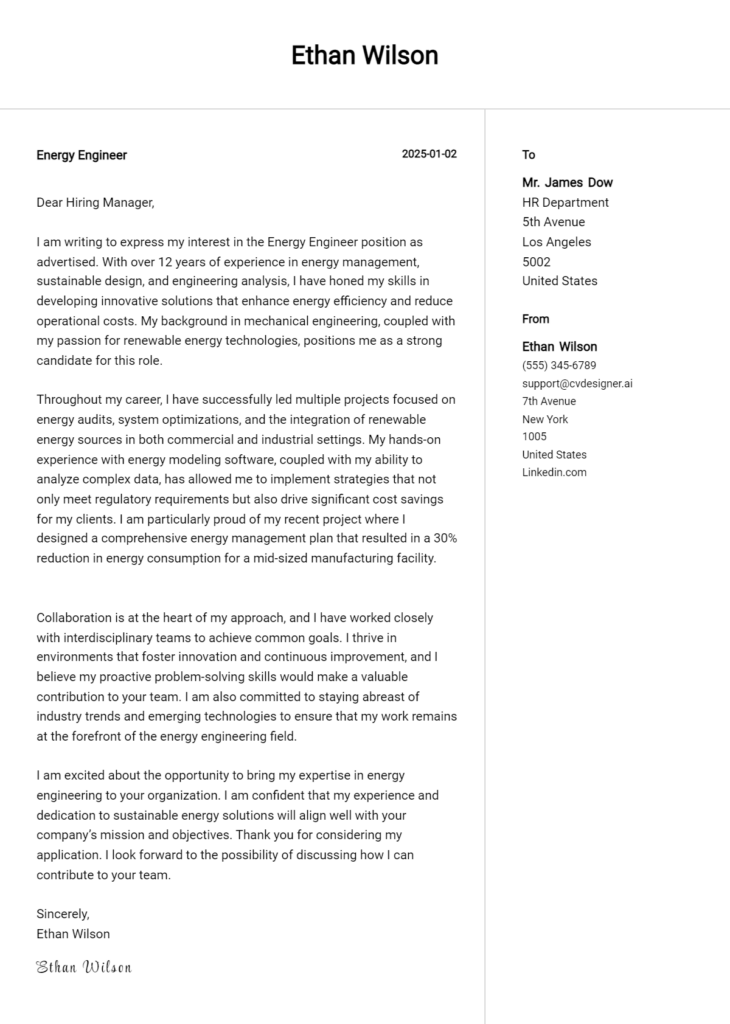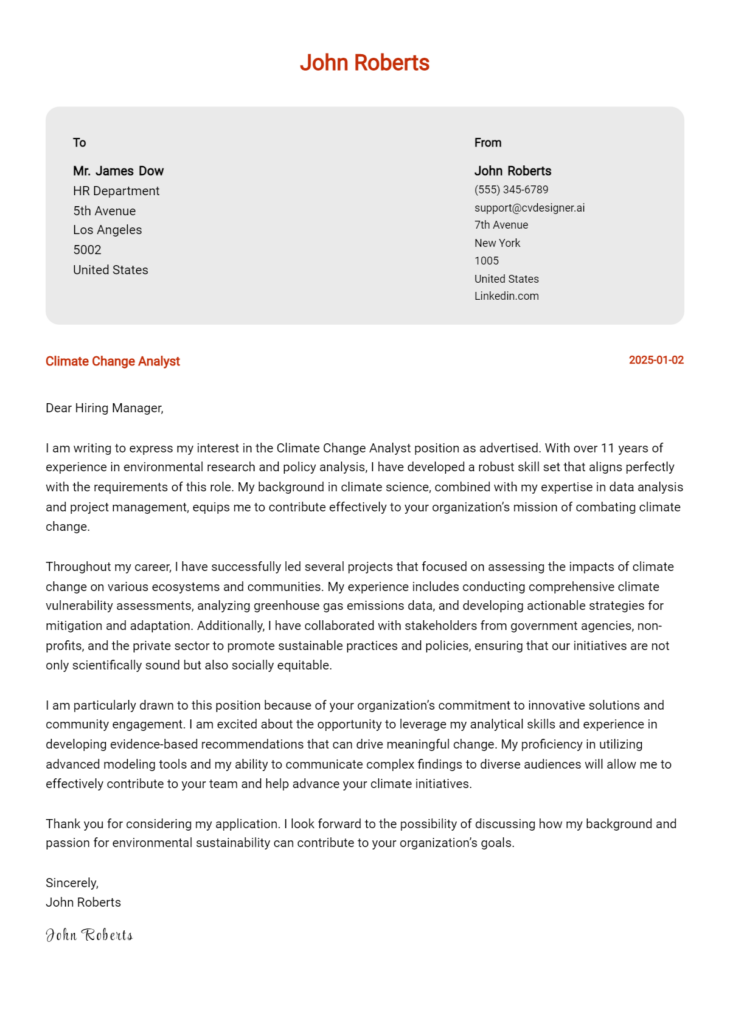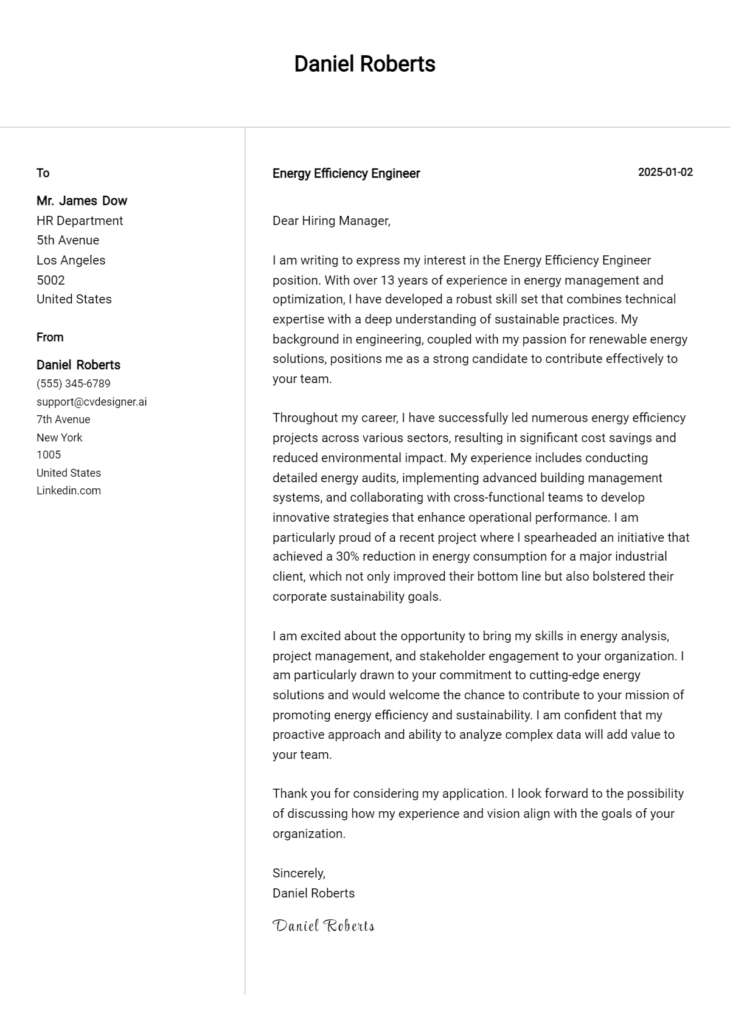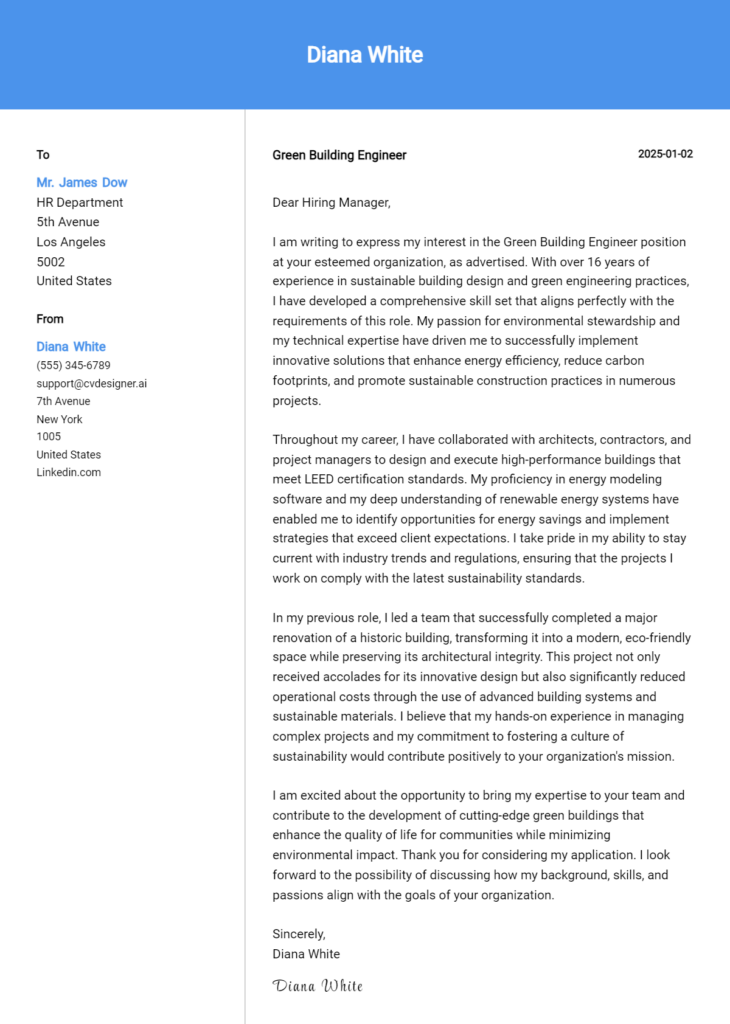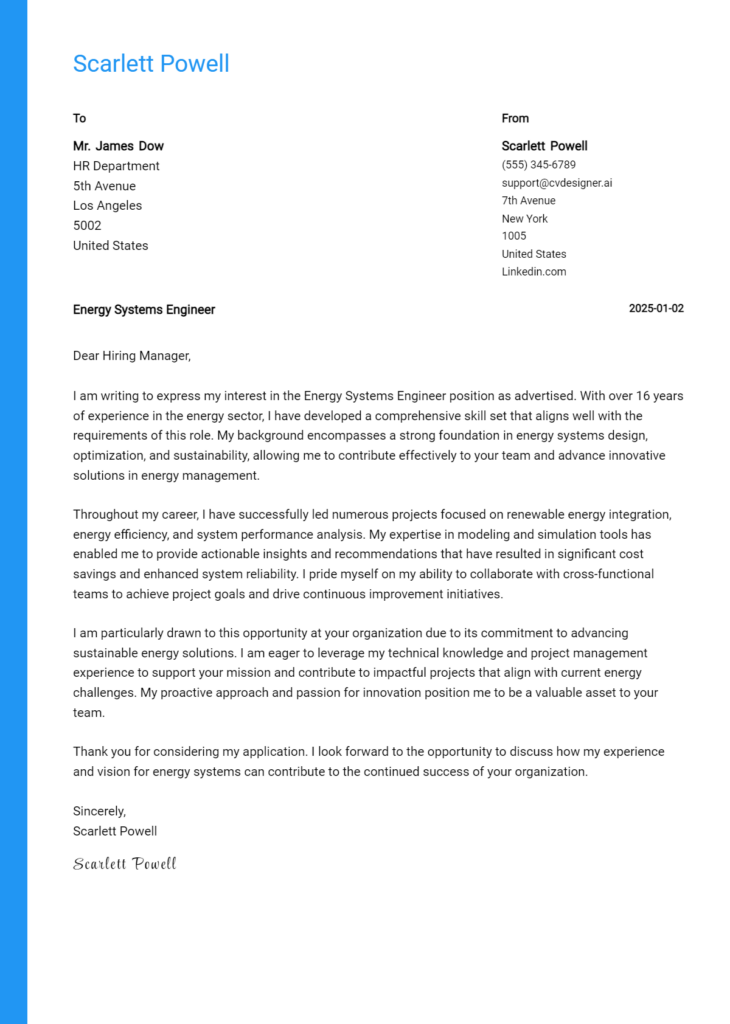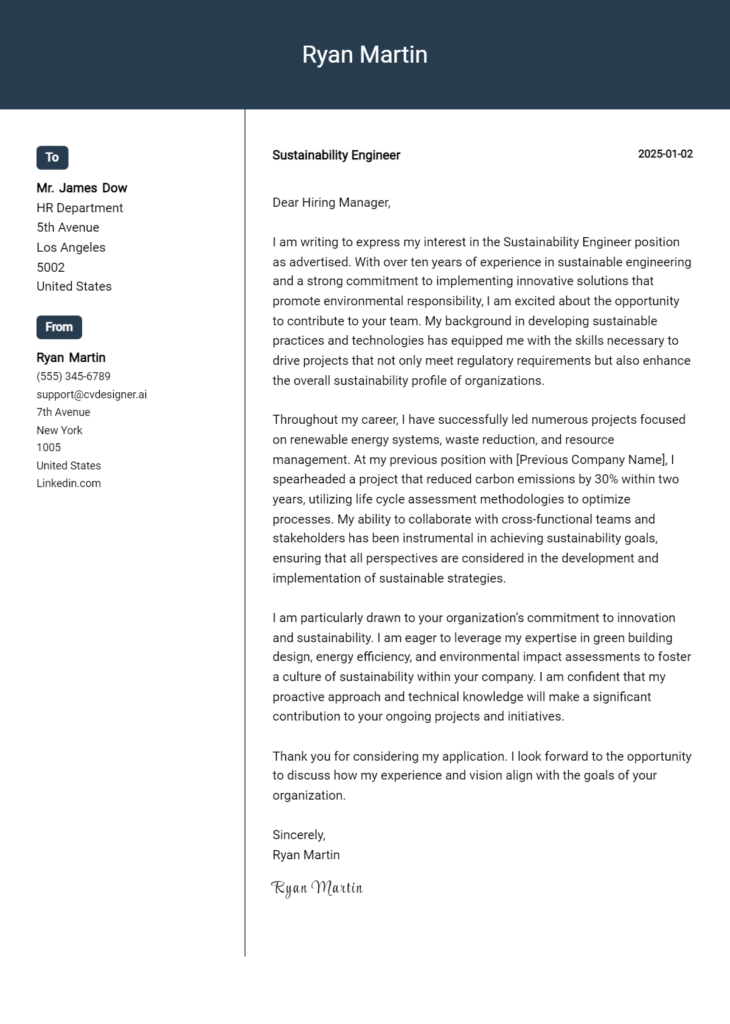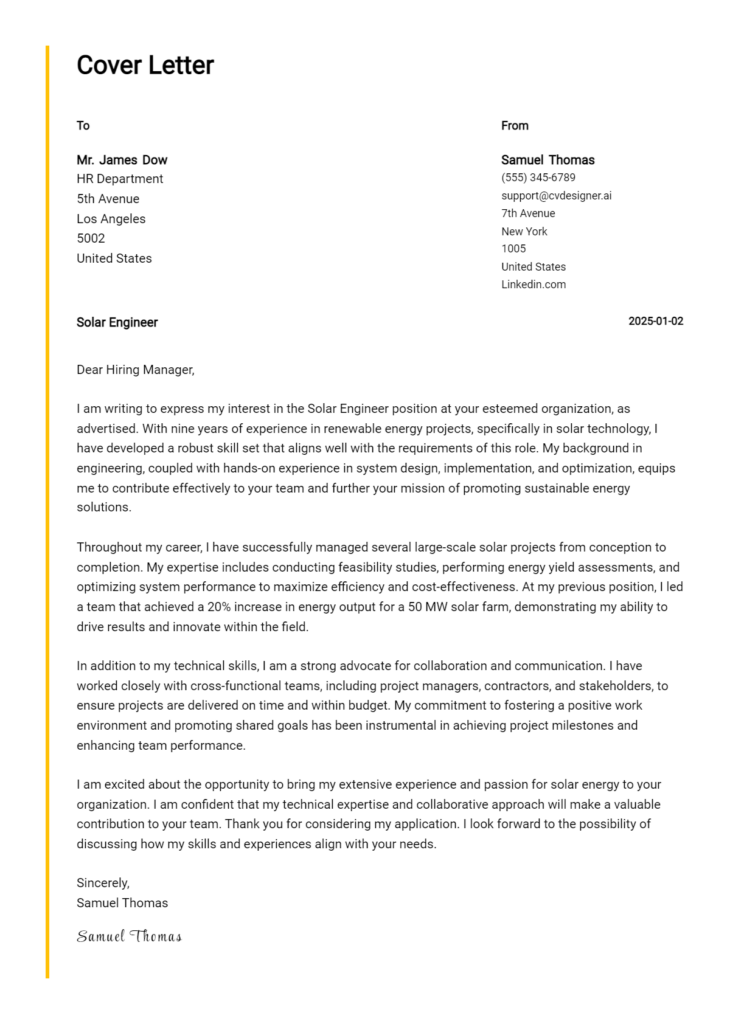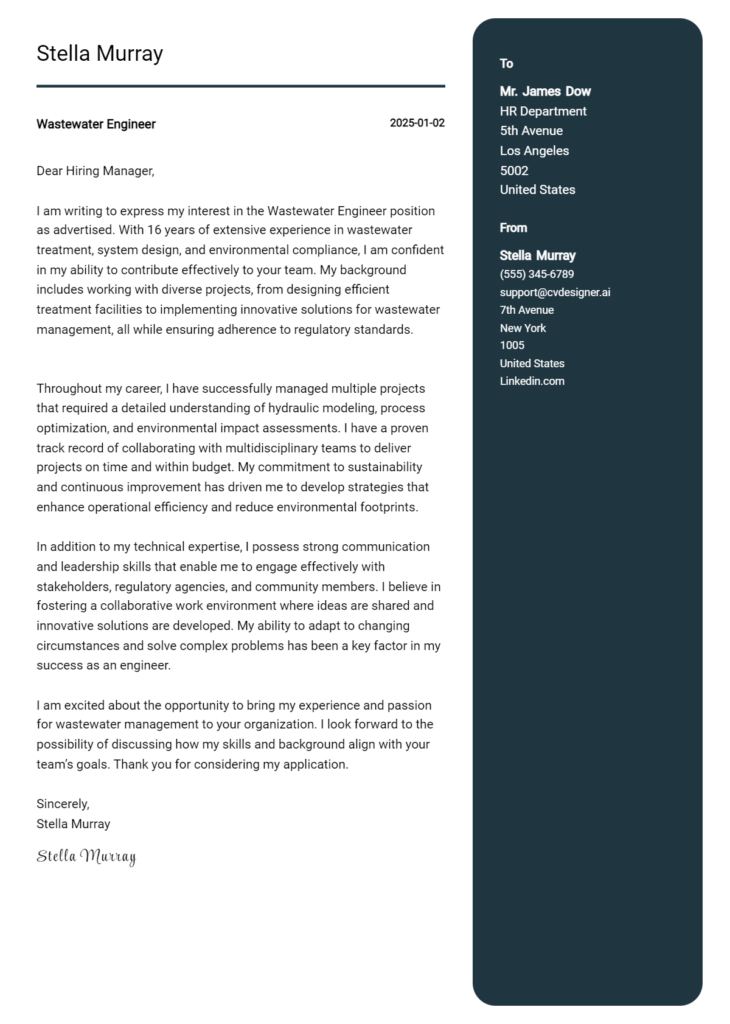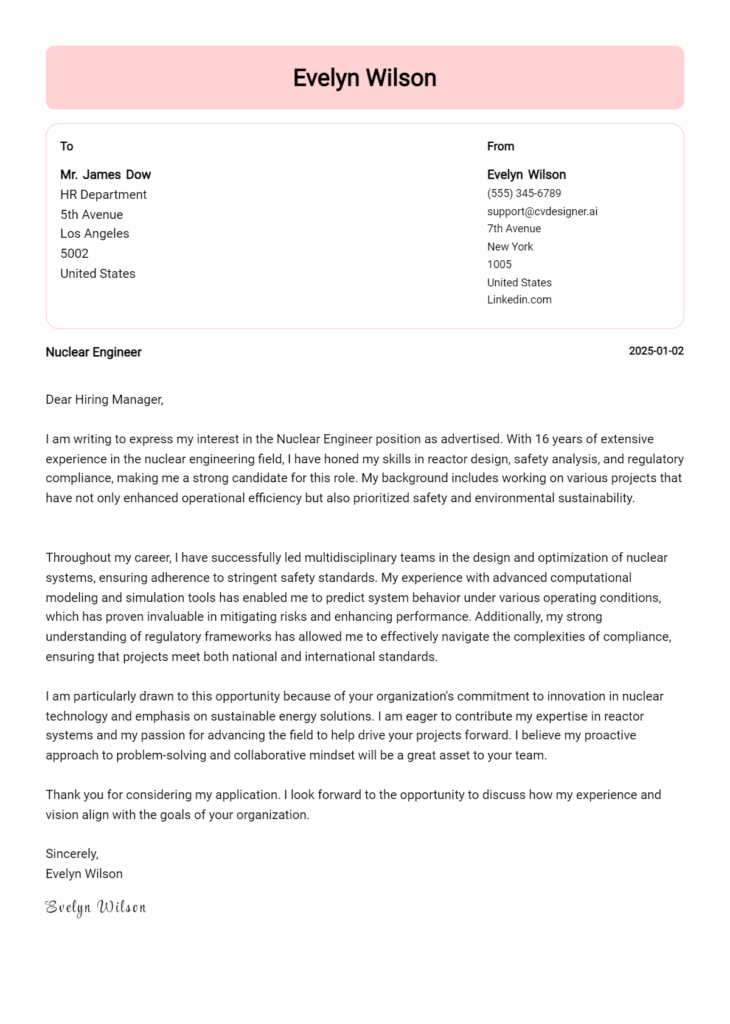Pollution Control Engineer Cover Letter Examples
Explore additional Pollution Control Engineer cover letter samples and guides and see what works for your level of experience or role.
How to Format a Pollution Control Engineer Cover Letter?
Crafting a compelling cover letter is essential for a Pollution Control Engineer, as it not only showcases your qualifications but also demonstrates your commitment to environmental stewardship and regulatory compliance. Proper formatting is crucial, as it reflects your meticulous nature and ability to communicate complex information clearly—attributes that are vital in the field of pollution control. A well-structured cover letter will capture the hiring manager's attention and effectively convey your technical skills and experience.
In this guide, we will outline how to format your cover letter, focusing on the essential components that will make your application stand out. These include:
- Cover Letter Header
- Cover Letter Greeting
- Cover Letter Introduction
- Cover Letter Body
- Cover Letter Closing
Each section serves a specific purpose in highlighting your expertise and professionalism. Let’s delve into each part to help you create a standout cover letter for your role as a Pollution Control Engineer.
Importance of the Cover Letter Header for a Pollution Control Engineer
The cover letter header is a crucial component of any professional correspondence, including for a Pollution Control Engineer. It serves as the first impression and establishes the tone for the rest of the document. A well-structured header should include your contact information, the date, and the recipient's details, ensuring clarity and professionalism. This allows the hiring manager to easily identify who you are and how to reach you, while also conveying your attention to detail. Here are examples of a strong and weak cover letter header to illustrate the difference.
Strong Example
John Doe 123 Environmental Way Green City, ST 12345 (123) 456-7890 johndoe@email.com October 1, 2023 Jane Smith Hiring Manager Eco Solutions Inc. 456 Clean Air Ave Green City, ST 12345
Weak Example
John D. 123 St. 10/1/23 To Whom It May Concern
The Importance of the Cover Letter Greeting
The greeting in a cover letter serves as the first impression and sets the tone for the rest of the document. A well-crafted greeting demonstrates professionalism and personal touch, especially when addressing the hiring manager directly. It shows that you have taken the time to research and understand the company and the person you are reaching out to, which can help you stand out among other applicants. To avoid sounding generic, it’s essential to find the recipient’s name, which can often be done through a quick search on the company’s website or LinkedIn profile. A personalized greeting not only engages the reader but also establishes a connection, making them more likely to read your letter with interest.
Strong Greeting Example
Dear Ms. Johnson,
Weak Greeting Example
To Whom It May Concern,
The Importance of a Strong Cover Letter Introduction for a Pollution Control Engineer
A well-crafted cover letter introduction is crucial for a Pollution Control Engineer, as it serves as the first impression to the hiring manager. This opening paragraph should not only capture attention but also convey genuine enthusiasm for the role, highlighting the candidate's relevant skills and achievements. A compelling introduction sets the tone for the rest of the cover letter, providing a snapshot of the candidate's qualifications and their commitment to environmental sustainability. Below are examples of strong and weak introductions to illustrate the impact of a well-structured opening.
Strong Example:
Dear [Hiring Manager's Name], I am excited to apply for the Pollution Control Engineer position at [Company Name], where I can leverage my five years of experience in waste management and environmental compliance to contribute to your mission of creating a cleaner, more sustainable future. My recent project, which successfully reduced emissions by 30% for a major manufacturing client, demonstrates my commitment to innovative solutions in pollution control and my ability to work collaboratively with multidisciplinary teams.
Weak Example:
To whom it may concern, I am applying for the Pollution Control Engineer job. I have some experience in environmental science, and I think I could do okay in this role. I have worked on a few projects and have a degree in engineering.
Purpose of the Cover Letter Body for a Pollution Control Engineer
The cover letter body for a Pollution Control Engineer serves as a critical platform for candidates to showcase their relevant skills, experiences, and the unique value they can bring to an organization. It is an opportunity to highlight specific projects or accomplishments that demonstrate their expertise in pollution control technologies, regulatory compliance, and environmental impact assessments. A strong cover letter body not only outlines technical competencies but also reflects a candidate's commitment to sustainable practices and effective problem-solving abilities, which are essential in this field. By detailing past achievements, such as successfully leading a project that reduced emissions by a significant percentage or implementing a waste management system that improved efficiency and compliance, candidates can persuade potential employers of their potential contributions.
Strong Example
Dear Hiring Manager, I am excited to apply for the Pollution Control Engineer position at EcoSolutions Inc. My experience includes leading a project that successfully reduced industrial emissions by 30% over two years through the implementation of advanced filtration systems and rigorous compliance audits. Additionally, I played a key role in developing a waste management strategy for a major manufacturing plant, which not only decreased waste disposal costs by 25% but also enhanced the company’s sustainability profile. I am eager to bring my expertise in environmental regulations and innovative pollution control technologies to EcoSolutions, helping to achieve both regulatory compliance and environmental stewardship.
Weak Example
Dear Hiring Manager, I am applying for the Pollution Control Engineer position. I have a degree in environmental engineering and some experience. I worked on a project where we tried to reduce pollution, but I don’t remember the details. I think I would be a good fit because I like to help the environment and have been interested in pollution control for a long time.
Importance of the Cover Letter Closing for a Pollution Control Engineer
The closing paragraph of a cover letter serves as a critical opportunity to reinforce your qualifications as a Pollution Control Engineer, reiterate your enthusiasm for the position, and encourage the hiring manager to take the next steps—such as reviewing your resume or scheduling an interview. A strong closing leaves a lasting impression and motivates the reader to take action, while a weak closing may fail to convey your commitment and suitability for the role.
Strong Example
Thank you for considering my application for the Pollution Control Engineer position at [Company Name]. With my extensive experience in environmental compliance and my passion for sustainable practices, I am excited about the opportunity to contribute to your team. I look forward to discussing how my skills can help advance your environmental initiatives. Please feel free to contact me at your earliest convenience to schedule an interview. I am eager to bring my expertise to [Company Name] and help make a positive impact on our environment.
Weak Example
Thanks for looking at my cover letter. I hope you think I’m a good fit for the job. If you want to talk more, you can call me. I really need a job, so I hope to hear from you soon.
Common Mistakes to Avoid in a Pollution Control Engineer Cover Letter
Crafting an effective cover letter is essential for a Pollution Control Engineer seeking to make a strong impression on potential employers. Avoiding common mistakes can significantly enhance your chances of securing an interview. Here are some frequent pitfalls to watch out for:
Generic Salutations: Using "To Whom It May Concern" can make your letter feel impersonal. Research the hiring manager's name to personalize your greeting.
Neglecting Specifics: Failing to highlight relevant experience can weaken your application. Tailor your cover letter to showcase specific projects or achievements in pollution control.
Poor Formatting: A cluttered or unprofessional layout can detract from your message. Adhere to a clear and professional cover letter format to ensure readability.
Lengthy Paragraphs: Long blocks of text can be overwhelming. Use concise paragraphs and bullet points to improve clarity and engagement.
Repetition of the Resume: A cover letter should complement your resume, not restate it. Focus on elaborating on key experiences rather than reiterating your entire work history.
Lack of Enthusiasm: A monotonous tone can signal disinterest. Infuse your passion for environmental protection and pollution control into your writing.
Ignoring the Job Description: Failing to align your skills with the job requirements can be detrimental. Carefully review the job description and incorporate relevant keywords to demonstrate your fit.
By steering clear of these common mistakes and referencing helpful cover letter examples, you can create a compelling cover letter that effectively showcases your qualifications and enthusiasm for the role.
Cover Letter FAQs for Pollution Control Engineer
What should I include in my cover letter as a Pollution Control Engineer?
In your cover letter, you should include your relevant educational background, such as a degree in environmental engineering or a related field. Highlight specific experiences that demonstrate your expertise in pollution control technologies, regulatory compliance, and environmental assessments. Mention any certifications, such as Professional Engineer (PE) or certifications from organizations like the American Academy of Environmental Engineers and Scientists (AAEES). Additionally, discuss your familiarity with environmental regulations, your ability to work collaboratively with stakeholders, and your problem-solving skills in addressing pollution issues. Tailor your cover letter to the specific job description, showcasing how your skills align with the company's objectives.
How can I demonstrate my passion for environmental protection in my cover letter?
To convey your passion for environmental protection, share personal anecdotes that illustrate your commitment to sustainability and pollution control. Discuss any volunteer work, internships, or projects that reflect your dedication to the field. You might mention participation in local clean-up efforts, advocacy for environmental policies, or coursework focused on pollution reduction techniques. Additionally, express your enthusiasm for the company's mission and values in promoting environmental health. Use specific examples to showcase your proactive approach to addressing pollution challenges and your desire to contribute positively to the community through your work as a Pollution Control Engineer.
How do I address my lack of experience in my cover letter?
If you're lacking direct experience as a Pollution Control Engineer, focus on transferable skills and relevant coursework. Highlight internships, volunteer experiences, or projects where you applied your knowledge of environmental science, engineering principles, or regulatory compliance. Emphasize your ability to learn quickly and adapt to new challenges. Additionally, showcase any related skills, such as data analysis, project management, or teamwork, that can be valuable in the role. Mention your eagerness to grow within the field and your commitment to continuous learning. Employers often value enthusiasm and a willingness to learn alongside formal experience, so ensure your cover letter reflects that mindset.
How do I tailor my cover letter for a specific job application?
To tailor your cover letter for a specific job application, start by carefully reading the job description and noting the key requirements and responsibilities. Identify keywords and phrases that reflect the skills and experiences the employer is seeking. In your cover letter, weave these keywords into your narrative, demonstrating how your background aligns with their needs. Highlight specific achievements or projects that relate directly to the role. Research the company’s mission, values, and any recent initiatives in pollution control, and reference these in your letter to show your genuine interest in the organization. Personalizing your cover letter in this way can significantly increase your chances of making a positive impression.
Build your Cover Letter in minutes
Use an AI-powered cover letter builder and have your letter done in 5 minutes. Just select your template and our software will guide you through the process.

